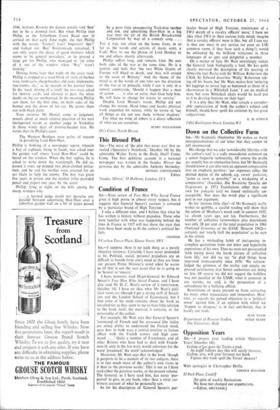suppose there is no such thing as a purely
objective reviewer. Certainly I have never pretended to be. Political, social, personal prejudices are as difficult to banish from one's mind as they are from our present Prime Minister's mind when he warns us (if that is not the mot juste) that he is going to be 'honest' or 'sincere.'
I have, however, read Major-General Sir Edward
Spears's Two Men Who Saved France, and I have also read Mr D. C. Watt's review of it (SPECTATOR, October 14). I have no idea what Mr Watt's poli- tical views are (though I get a strong sniff of Social-
ism and the London School of Economics), but I find some of his snide remarks about the book as uncalled-for as they seem to me to bear little relation to the book itself, the material it contains, or the personality of the author.
For example, Mr Watt says that General Spears's 'command of French and his presumed [the italics are mine] ability to understand the French mind, gave him in both wars a central position as liaison officer with the French armies and high com- mand. . . .' Quite a number of Frenchmen, and of other Britons who have had to deal with French- men (I, only in the last war), would substitute for the word 'presumed,' the word `acknowledged.'
Moreover, Mr Watt says that in the book 'though it purports to be a memoir of its two subjects, there is in fact much more of the author's own views in it than in the previous works.' This is not as I have read either the previous works, or the present volume. The General, as I have read him, has never 'pur- ported' to give, in any book, other than a vivid eye- witness account of what he personally saw.
As for his description of 'General Spears's par-
titular brand of High Toryism, reminiscent of a TW3 sketch of a cavalry officers' mess,' I have no idea what TW3 in their curious little minds imagine that a cavalry officers' mess is like, but all I can say is that any mess in any service (or even an LSE common room, if they have such a thing!), would be enlivened by the brilliant witticisms in three languages of so spry and delightful a member.
On a matter of fact, Mr Watt unwittingly makes the General look biologically a fool. He has quite clearly- mis-read the description of his meeting at Abbeville (not Paris) with Sir William Robertson the CIGS. Sir Edward describes 'Wully' Robertson tak- ing off his boots, but Mr Watt makes him 'unlacing his leggings to reveal legs as bunioned as those of a charwoman in a Whitehall farce.' I am no medical man, but even Whitehall chars would be hard put to it to develop bunions on their legs!
It is a pity that Mr Watt, who reveals a consider- able appreciation of both the author's subject and himself, should have spoilt his criticism by too great subjectivism.
E. D. O'BRIEN
2 Old Burlington Street, London W1


































 Previous page
Previous page